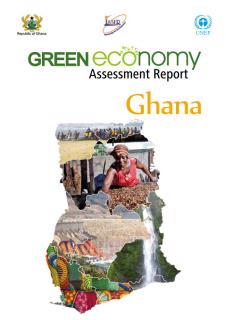
In 2012 it was estimated that the cost to Ghana of environmental degradation was equivalent to ten per cent of its GDP. By placing sustainability at the heart of its development planning, Ghana will be better positioned to address challenges of unemployment, sustained economic growth and poverty reduction.
The study Green Economy Assessment Report: Ghana provides comparative scenarios for future growth that estimates economic, environmental and social impacts. It provides recommendations on how greening the agriculture, energy and forestry sectors can catalyze a transition to a green economy in Ghana. Furthermore the study shows clear economic, environmental and social benefits from a transition to a green economy such as strong economic development coupled with more efficient use and preservation of natural resources. Ultimately a transition to a green economy is helpful for Ghana achieving multiple Sustainable Development Goals.
The findings show that green economy policies would produce 200,000 to 400,000 more jobs than Business-as-usual. Furthermore, by greening the economy, poverty is projected to decrease at a higher rate than Business-as-usual and the economy would grow at a rate between 6.5 and 6.9 per cent, instead than 5.9 per cent.
